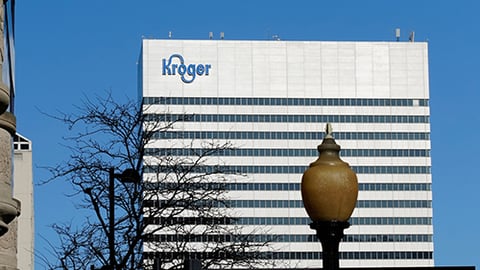How Retailer Subsidies Affect the Grocery Playing Field
As the industry and stakeholders around the country await legal decisions related to the powerhouse proposed merger between The Kroger Co. and Albertsons Cos., one industry observer is weighing in on the current competitive playing field in grocery.
Burt P. Flickinger III, managing director of New York City-based consulting firm Strategic Resource Group, recently shared in a LinkedIn post that Kroger’s recent performance has been fueled by strength in private label sales, the closing of drug stores such as Rite-Aid, Walgreens and CVS across the United States, the company’s meritocracy in hiring and promotions and the presence and its strength in stores located in middle- and limited-income neighborhoods. Flickinger also noted that Kroger is in a position to help boost sales, profits and jobs at various Albertsons stores that are currently operating below norms.
“As good as Kroger’s numbers are today in an overall down stock market, they’ll be even better next year and the years ahead,” he projected.
[RELATED: Class Action Filed Against Kroger, Albertsons Over No-Poach Agreements]
In an interview with Progressive Grocer, Flickinger expanded on those points, noting that if the Kroger-Albertsons merger goes through, the new organization will be on a solid competitive footing in a playing field that isn’t, in his opinion, as level as it could be. “The biggest takeaway is that certain retailers including Amazon, Costco, Target and others get these federal subsidies, and Kroger, Albertsons and other chains like Hy-Vee see next to nothing by comparison,” he declared.
Flickinger contends that retail businesses that receive more and greater taxpayer-funded and government subsidies get a proverbial leg up and some end up closing stores in communities where they had set up shop, affecting civic budgets and residents.
“Those stores that have opened have taken business from an existing store,” he said, adding that although subsidies are available and the companies that take them often do good work, it isn’t always fair for certain competitors, workers and shoppers.
There will be changes with the incoming Trump Administration, as some retailers are expected to receive fewer federal subsidies. Still, Flickinger maintained, other and often-large subsidies come from state, county and local governments and, ultimately, subsidy disparities have a ripple effect. “It can result on an operating basis in a few cents on the dollar and that can be a big difference in what food and drug combination stores make,” he pointed out.
Flickinger and his colleague, Henry Mellet, senior director at Strategic Resource Group, recently published studies related to the competitive landscape and labor situations within the grocery industry.






